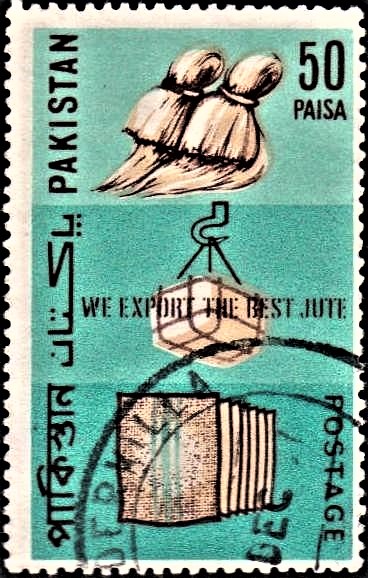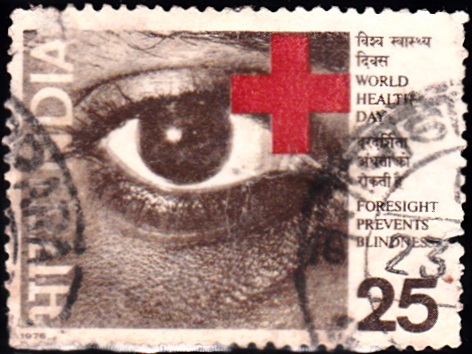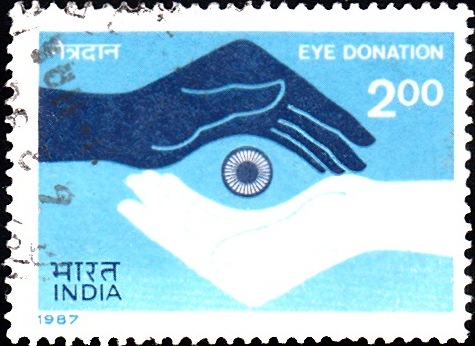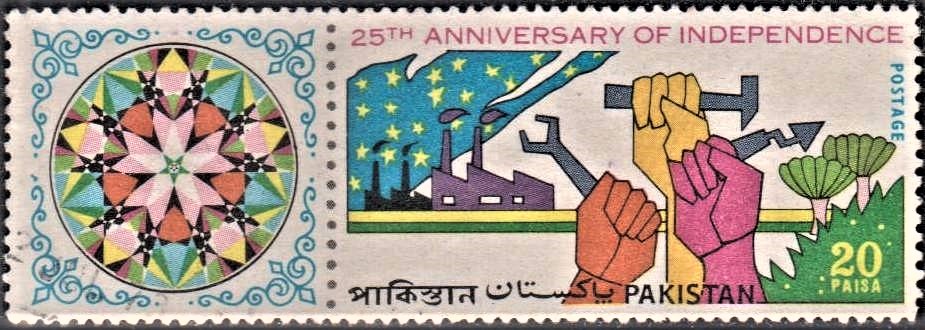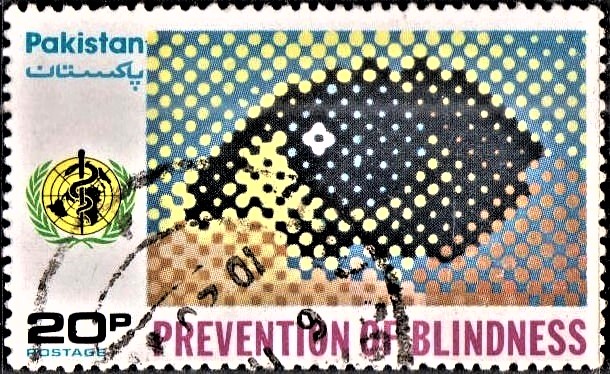
Pakistan on World Health Day 1976
A commemorative postage stamp on the World Health Day (7 April) : Prevention of Blindness :
 Issued by Pakistan
Issued by Pakistan
Issued on Apr 7, 1976
Issued for : The United Nations has declared April 7, 1976 as the day devoted to the “Prevention of Blindness”. Eye sight is the choicest gift of God and an invaluable blessing. Every effort, therefore, must be made to protect this gift and to ensure its continued utility to the maximum and for the longest possible period. This day should be observed by bringing home to the people how best the above objective can be achieved. Pakistan Post Office is bringing out a special stamp of 20-Paisa on this day to highlight the importance of the eye and the need to protect it.
Description : The format of the stamp is horizontal. In a big rectangle at the right hand side of the stamp is shown a human eye appearing through a multi-colour screen of reverse and solid dots, emphasizing the importance of the eye on the one hand and drawing a contrast between colourful vision and total darkness due to blindness on the other. The slogan “Prevention of Blindness” appears in bold letters underneath the rectangle in red colour. In the white panel at the left side of the rectangle appears the word ‘Pakistan‘ in English and Urdu at the top in blue colour. The W.H.O. emblem appears in the centre of the panel in green, yellow and black colour, while the denomination ’20P’ appears at the bottom in black with the word ‘Postage’ underneath in blue colour.
Designer : Mian Mohammad Saeed
Type : Stamp, Postal Used
Denomination : 20 Paisa
Colours : Yellow / Magenta / Cyan / Black
Size of Stamp : 50.80 x 30.70 mm
Size of Print : 47.80 x 27.70 mm
Perforation Gauge : 13 x 13 C
Quantity : 1.0 million
No. of Stamps in each sheet : 50 (Fifty)
Process of Printing : Litho Offset
Printers : Pakistan Security Printing Corporation Limited, Karachi
About :
- Some simple rules which, when followed regularly, will ensure the well-being of the eye-sight are mentioned below:
- 1) Never read in dim light.
- 2) While reading, a distance between the reading matter and eyes should be at least 14 inches.
- 3) Avoid reading in dazzling light or with sunshine on the books.
- 4) Arrange testing of eye-sight at regular intervals.
- 5) Avoid reading in running trains or vehicles as the shaking affects the eye-sight.
- 6) Wash the eyes with cold water every morning and evening.
- 7) Personal cleanliness helps prevent eye diseases.
- 8) Do not use some-body else’s towels and handkerchiefs.
- 9) Do not put any medicine in the eyes unless it is prescribed by some qualified doctor.
- 10) Use spectacles when advised by a qualified doctor.
- 11) There is hereditary blindness also. Therefore, it is necessary to consult a Specialist before marriage is arranged.
- 12) A good diet helps in preventing eye diseases particularly when it contains sufficient Vitamin ‘A’.
- 13) Never look at the sun with naked eyes.
- With the built-in mechanism for safety and protection, and the observance of the above rules, the gift of eye-sight can be enjoyed uninterrupted except on rare occasions. There are normally some danger signals to indicate possible presence or approach of any eye disease for which a qualified eye specialist must be consulted without any delay. Some of the danger signals are mentioned below:Eye needs attention:—
- (i) if they itch or hurt;
- (ii) if the eye-lids are inflamed;
- (iii) if there are sties or there are little white particles along the edges of the lids;
- (iv) if objects near or distant are not clearly visible and
- (v) if there are frequent attacks of headache.
- Some of the common diseases which can lead to blindness unless attended to carefully and in time, are glaucoma, cataract, conjunctivitis and corneal opacity. Most of the diseases can be attended to successfully by the eye surgeons and eye specialists but the treatment and care of corneal opacity requires the corneas from human eyes taken out from the dead bodies. Although eyes from dead bodies are being imported in a small way from Sri Lanka, the total number required in Pakistan every year is so large that unless people donate their eyes after death as a service to humanity and corneas are available from dead bodies within the country, patients with corneal opacity will continue to go blind.
- It is the duty of every Pakistani to donate eyes after death so that blindness due to corneal opacity may be eliminated in this country. Let every Pakistani resolve on this day of “Prevention of Blindness” to donate eyes after death as a service to humanity.
- Issued by: The Director General, Pakistan Post Office, Karachi.


